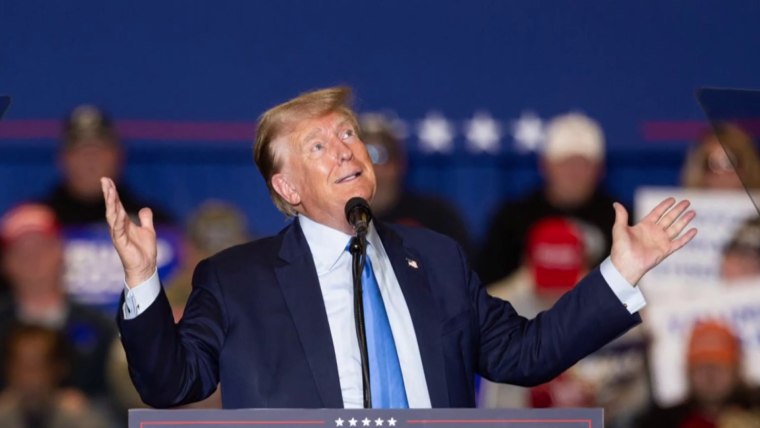As Veterans Day got underway, President Joe Biden’s re-election campaign unveiled a new minute-long television ad, titled “Proud,” highlighting the Democrat having signed the PACT Act, which expanded benefits for veterans exposed to toxic chemicals and their families.
A few hours later, the president delivered remarks at the memorial amphitheater at Arlington National Cemetery. “Most Americans never see the sacrifices that you as family members also make,” Biden said. “They will never see those holidays, birthdays, made special even with the empty seat at the dinner table. ... They’ll never see all of those nights spent waiting for word from a loved one deployed overseas because you are not sure. Too often, the sacrifices go without thanks or without acknowledgment. We must remember only 1% of our society today protects 99% of us.”
Around the same time, his predecessor and likely 2024 rival issued a related message of his own. Of course, Donald Trump’s approach to Veterans’ Day was a little different. Here, for example, is the message the Republican published to his social-media platform on Saturday afternoon:
“In honor of our great Veterans on Veteran’s Day [sic], we pledge to you that we will root out the Communists, Marxists, Fascists, and Radical Left Thugs that live like vermin within the confines of our Country, lie, steal, and cheat on Elections, and will do anything possible, whether legally or illegally, to destroy America, and the American Dream. The threat from outside forces is far less sinister, dangerous, and grave, than the threat from within.”
The former president echoed the message soon after at an event in New Hampshire. “The threat from outside forces is far less sinister, dangerous, and grave than the threat from within,” Trump told an audience in Claremont, N.H.
It’s important to emphasize that Trump’s rhetorical excesses are not new. To know anything about the Republican is to know that he, on a nearly daily basis, finds new and needlessly provocative ways to shock, offend, insult, and degrade. It’s a core element of his personality, and the more people are outraged by what he says, the more the former president seems to revel in their disgust.
With this in mind, there’s generally little value in reacting too strongly to every rhetorical escalation. The question of who he is was answered years ago.
But once in a while, Trump pushes the envelope in ways that warrant attention. Pouncing on every stray social-media message is unwise, but so too is looking the other way when the frontrunner for the GOP nomination crosses radical lines with broader implications.
Part of the problem with Trump’s Veterans Day message was the peek into a twisted perspective. The former president believes he’s identified the United States’ biggest problem: Americans he doesn’t like.
As regular readers may recall, in September 2016, Hillary Clinton delivered remarks in which she took aim at Trump’s radicalized base. To be “grossly generalistic,” she said, “you could put half of Trump’s supporters into what I call the ‘basket of deplorables.’”
More specifically, Clinton lamented the fact that so much of Trump’s core support is “racist, sexist, homophobic, xenophobic, [and] Islamaphobic” — an assessment that’s stood up pretty well to further scrutiny.
Nevertheless, Republicans became obsessed with the line, and the media soon followed. I’ll confess that I never fully understood why this became a furious point of contention, but the conventional wisdom was that Clinton had gone too far: Criticizing rival politicians is fine, but criticizing Americans, even bigoted Americans, is beyond the pale for someone seeking the nation’s highest office.
Trump, meanwhile, has gone from describing many Americans as “evil” to condemning them as “vermin.”
Just as importantly, his choice of words has historical antecedents. Ruth Ben-Ghiat, an NYU historian, told The Washington Post that “calling people ‘vermin’ was used effectively by Hitler and Mussolini to dehumanize people and encourage their followers to engage in violence.”
It’s an unusual word choice for the Republican, but as Trump removes all subtlety from his authoritarian vision, it’s now a new normal for the GOP’s most powerful figure.
As upsetting as the resulting image is, it’s best not to look away.

